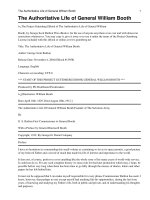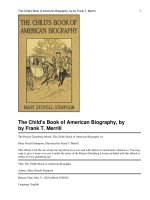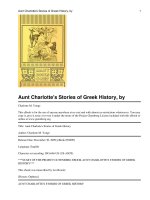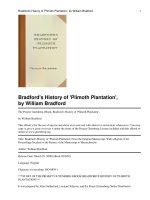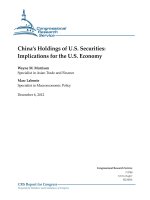American Boy''''s Life of Theodore Roosevelt potx
Bạn đang xem bản rút gọn của tài liệu. Xem và tải ngay bản đầy đủ của tài liệu tại đây (949.37 KB, 145 trang )
CHAPTER I
CHAPTER II
CHAPTER III
CHAPTER IV
CHAPTER V
CHAPTER VI
CHAPTER VII
CHAPTER VIII
CHAPTER IX
CHAPTER X
CHAPTER XI
CHAPTER XII
CHAPTER XIII
CHAPTER XIV
CHAPTER XV
CHAPTER XVI
CHAPTER XVII
CHAPTER XVIII
CHAPTER XIX
1
CHAPTER XX
CHAPTER XXI
CHAPTER XXII
CHAPTER XXIII
CHAPTER XXIV
CHAPTER XXV
CHAPTER XXVI
CHAPTER XXVII
CHAPTER XXVIII
CHAPTER XXIX
CHAPTER XXX
CHAPTER I
CHAPTER II
CHAPTER III
CHAPTER IV
CHAPTER V
CHAPTER VI
CHAPTER VII
CHAPTER VIII
CHAPTER IX
CHAPTER X
CHAPTER XI
CHAPTER XII
CHAPTER XIII
CHAPTER XIV
CHAPTER XV
CHAPTER XVI
CHAPTER XVII
CHAPTER XVIII
CHAPTER XIX
CHAPTER XX
CHAPTER XXI
CHAPTER XXII
CHAPTER XXIII
CHAPTER XXIV
CHAPTER XXV
CHAPTER XXVI
CHAPTER XXVII
CHAPTER XXVIII
CHAPTER XXIX
CHAPTER XXX
American Boy's Life of Theodore Roosevelt, by
Edward Stratemeyer This eBook is for the use of anyone anywhere at no cost and with almost no restrictions
whatsoever. You may copy it, give it away or re-use it under the terms of the Project Gutenberg License
included with this eBook or online at www.gutenberg.org
Title: American Boy's Life of Theodore Roosevelt
Author: Edward Stratemeyer
American Boy's Life of Theodore Roosevelt, by 2
Release Date: August 18, 2007 [EBook #22352]
Language: English
Character set encoding: ISO-8859-1
*** START OF THIS PROJECT GUTENBERG EBOOK THEODORE ROOSEVELT ***
Produced by David Edwards, Graeme Mackreth and the Online Distributed Proofreading Team at
(This file was produced from scans of public domain material produced by Microsoft for
their Live Search Books site.)
[Illustration: American Boy's Life of Theodore Roosevelt
STRATEMEYER]
[Handwritten inscription: To Elmer, A Merry Christmas from Papa & Mamma. 1904]
AMERICAN BOYS' LIFE
OF
THEODORE ROOSEVELT
EDWARD STRATEMEYER'S BOOKS
Old Glory Series
Six Volumes. Cloth. Illustrated. Price per volume $1.25.
UNDER DEWEY AT MANILA. A YOUNG VOLUNTEER IN CUBA. FIGHTING IN CUBAN WATERS.
UNDER OTIS IN THE PHILIPPINES. THE CAMPAIGN OF THE JUNGLE. UNDER MacARTHUR IN
LUZON.
Stratemeyer Popular Series
Ten Volumes. Cloth. Illustrated. Price per volume $1.00.
THE LAST CRUISE OF THE SPITFIRE. REUBEN STONE'S DISCOVERY. TRUE TO HIMSELF.
RICHARD DARE'S VENTURE. OLIVER BRIGHT'S SEARCH. TO ALASKA FOR GOLD. THE YOUNG
AUCTIONEER. BOUND TO BE AN ELECTRICIAN. SHORTHAND TOM, THE REPORTER. FIGHTING
FOR HIS OWN.
War and Adventure Stories
Cloth. Illustrated. Price per volume $1.25.
ON TO PEKIN. BETWEEN BOER AND BRITON.
American Boys' Biographical Series
Cloth. Illustrated. Price per volume $1.25.
American Boy's Life of Theodore Roosevelt, by 3
AMERICAN BOYS' LIFE OF WILLIAM McKINLEY. AMERICAN BOYS' LIFE OF THEODORE
ROOSEVELT.
Colonial Series
Cloth. Illustrated. Price per volume $1.25.
WITH WASHINGTON IN THE WEST. MARCHING ON NIAGARA. AT THE FALL OF MONTREAL.
ON THE TRAIL OF PONTIAC.
Pan-American Series
Cloth. Illustrated. Price per volume $1.25.
LOST ON THE ORINOCO. THE YOUNG VOLCANO EXPLORERS. YOUNG EXPLORERS OF THE
ISTHMUS. YOUNG EXPLORERS OF THE AMAZON.
Great American Industries Series
Cloth. Illustrated. Price per volume $1.00, net. TWO YOUNG LUMBERMEN.
JOE, THE SURVEYOR. Price, $1.00. LARRY, THE WANDERER. Price, $1.00.
[Illustration: COLONEL ROOSEVELT AT SAN JUAN HILL]
AMERICAN BOYS' LIFE
OF
THEODORE ROOSEVELT
BY
EDWARD STRATEMEYER
AUTHOR OF "AMERICAN BOYS' LIFE OF WILLIAM McKINLEY," "WITH WASHINGTON IN THE
WEST," "OLD GLORY SERIES," "PAN-AMERICAN SERIES," "SHIP AND SHORE SERIES," ETC.
ILLUSTRATED FROM PHOTOGRAPHS AND WITH FRONTISPIECE BY CHARLES COPELAND
[Illustration]
BOSTON LEE AND SHEPARD 1904
PUBLISHED, AUGUST, 1904.
Copyright, 1904, by Lee And Shepard.
All Rights Reserved.
AMERICAN BOYS' LIFE OF THEODORE ROOSEVELT.
American Boy's Life of Theodore Roosevelt, by 4
Norwood Press J.S. Cushing & Co Berwick & Smith Co. Norwood, Mass., U.S.A.
PREFACE
The life of Theodore Roosevelt is one well worth studying by any American boy who wishes to make
something of himself and mount high on the ladder of success.
The twenty-sixth President of our country is a fine type of the true American of to-day, full of vim and vigor,
quick to comprehend, and equally quick to act, not afraid to defend his opinions against all comers when
satisfied that he is in the right, independent, and yet not lacking in fine social qualities, physically and morally
courageous, and with a faith in himself and his God that is bound to make for good so long as he clings to it.
Theodore Roosevelt comes from countless generations of fighting stock, both in this country and abroad. And
yet as a youth the future hero of San Juan Hill was a delicate lad, and many fears were entertained that he
might not live to manhood. But life in the open air, with judicious athletic exercise, accomplished wonders,
and he became strong and hardy to an astonishing degree.
The boyhood days of the future President were spent in New York City and at the family's country home,
Oyster Bay, Long Island. From there he went to Harvard College, from which he graduated with high honors.
Still somewhat delicate in health, he travelled in Europe, studied for a short time at Dresden, and took to
climbing the Alps and other noted mountains.
His mind had gravitated toward literature, and he was writing a naval history of the War of 1812 when
something prompted him to take up politics, and almost before he knew it he was elected a New York State
assemblyman. He served in this capacity for three terms, and many are the stories told of how he fought
against corruption first, last, and all the time.
The death of his first wife and of his beloved mother were at this time a great blow to him, and leaving his one
little daughter with relatives, he struck out for the great West, where, in the Bad Lands, so called, he located
as ranchman and hunter, filling in his spare hours by studying and by writing on various outdoor subjects,
works which have become decidedly popular, and which show well his gifts as an author and as an observer
of nature.
While still in great part a successful ranchman, he ran for mayor of New York and was defeated. He now
devoted himself with increased energy to his literary labors until, soon after, he was appointed by President
Harrison a member of the Civil Service Commission. He served on this commission with marked ability for
six years, when he resigned to become police commissioner of New York City.
Theodore Roosevelt's work as a police commissioner will not be readily forgotten. The whole tone of the
service was at once raised, and for the first time in many years the metropolis had "dry" Sundays, when every
saloon in the city was tightly closed. This strict compliance with the law made him some enemies, but to these
he paid no heed, for he was doing only his duty.
When William McKinley was nominated for the Presidency the first time, Theodore Roosevelt was one of his
most enthusiastic supporters. Upon the election of McKinley, John D. Long was appointed Secretary of the
Navy and Theodore Roosevelt became the First Assistant Secretary. Ever since writing his naval history the
newly appointed assistant had made a close study of naval matters, and now he applied himself with vigor to
the duties of his office; and it was primarily through his efforts that when the war with Spain came, our
war-ships and our coast defences were in much better condition than they had been at any time previous in our
history.
American Boy's Life of Theodore Roosevelt, by 5
With the outbreak of the war, Theodore Roosevelt resigned. "My duty here is done," he said. "My place is in
the field." And without loss of time he and his intimate friend, Dr. Leonard Wood, began the organization of
that body of troops which was officially designated as the First United States Volunteer Cavalry, but which
speedily became known everywhere as the Rough Riders, a body as unique as the world has ever seen, being
made up of men from all over the Union, but principally from four Territories, and including hunters,
cowboys, soldiers of fortune, foot-ball and base-ball champions, college graduates, ex-policemen, with
American, Irish, Dutch, German, Mexican, and Indian blood in their veins, truly a remarkable collection, but
every man and officer strong and hardy, full of courage, a good horseman, and a fine shot.
From the very start, the Rough Riders were anxious to get into the fight, and the opportunity was not long in
coming. From Florida the command was transported to Daiquiri, on the southern coast of Cuba, and then
began the advance upon the city of Santiago, which brought on the engagement at La Guasima, followed by
the thrilling battle of San Juan Hill, in which the Rough Riders distinguished themselves in a manner that will
never be forgotten. In the very thickest of this fight was Colonel Roosevelt, urging his men forward to victory,
regardless of the shot and shell falling upon all sides. A hero truly, and such heroes are not forgotten.
Upon the close of the war Theodore Roosevelt thought to retire to private life, but this was not to be. Arriving
at New York, he was hailed with delight by thousands, and at the next election was made governor of the
Empire State. As governor he made friends in both of the leading political parties by his straightforwardness
and his sterling honesty. Men might differ with him politically, but they could never accuse him of doing that
which he himself did not firmly believe was right.
His term as governor had not yet expired when President McKinley was nominated for a second term. Again
the people at large clamored for Roosevelt, and against his earnest protestations he was forced to accept the
nomination for the Vice-Presidency. He was elected, and at the proper time took his seat as presiding officer
of the Senate.
It was at this time a blow fell upon our nation from which we have scarcely yet recovered. President
McKinley was struck down by the cowardly hand of an assassin. The Vice-President was at this time off on
one of his favorite outings, but with all possible speed he came back and was sworn in as President. It was a
great responsibility, and many feared that great changes in our government might result. But the fears proved
groundless. Young as he was, and he is the youngest of all of our Presidents, he took upon himself the duty
of carrying out the intentions of his predecessor, and proving to the world once again that, even though a
President die, "the government at Washington still lives."
There is another side to the character of our President which must not be overlooked. He is of strong religious
convictions and a member of the Dutch Reformed Church. It is seldom that he is given to preaching, but when
he does his words have a sincerity that proves much for the foundation of his character. He stands for what is
honest and upright in political and private life, and although, being but human, he may make mistakes, he
remains a Chief Magistrate well deserving the highest honors our nation can bestow.
EDWARD STRATEMEYER. MAY 2, 1904.
CONTENTS
American Boy's Life of Theodore Roosevelt, by 6
CHAPTER I
PAGE Birthplace and Ancestry of Theodore Roosevelt His Father's Philanthropy City and Country
Home Days at School Religious Training. 1
CHAPTER I 7
CHAPTER II
Nicknamed Teddy Goes to Harvard College Member of Many Clubs Death of Mr. Roosevelt Anecdotes
of College Life 11
CHAPTER II 8
CHAPTER III
Marries Miss Alice Lee Travels in Europe Bold Mountain Climbing Elected to the Assembly Personal
Encounter with the Enemy 20
CHAPTER III 9
CHAPTER IV
Theodore Roosevelt and Governor Cleveland Good Work as an Assemblyman Some Measures pushed
through Birth of Alice Roosevelt Death of Mr. Roosevelt's Mother 30
CHAPTER IV 10
CHAPTER V
Theodore Roosevelt as a Ranchman and Hunter in the Bad Lands Bringing down his First
Buffalo Rattlesnakes and a Wild Goose 39
CHAPTER V 11
CHAPTER VI
Grouse and Other Small Game The Scotchman and the Skunk Caught in a Hailstorm on the
Prairie Bringing down Black-tail Deer 49
CHAPTER VI 12
CHAPTER VII
Runs for Mayor of New York City Marriage to Edith Kermit Carew Hunting in the Bighorn Mountains A
Wild Chase after Three Elk 63
CHAPTER VII 13
CHAPTER VIII
Bringing down a Grizzly Bear Back to New York Appointed a Civil Service Commissioner The Work of
the Commission 74
CHAPTER VIII 14
CHAPTER IX
A Trip to the Shoshone Mountains Caught in a Driving Snowstorm Back to Work Resignation as Civil
Service Commissioner 85
CHAPTER IX 15
CHAPTER X
Appointed Police Commissioner of New York City Corruptness of the Department Strenuous Endeavors to
make Matters Better A "Dry" Sunday Enforcing the Tenement House Law and Other Measures 94
CHAPTER X 16
CHAPTER XI
Appointed First Assistant Secretary of the Navy The Condition of Affairs in Cuba Preparing for
War Theodore Roosevelt's Resolve 104
CHAPTER XI 17
CHAPTER XII
Destruction of the Maine Dewey's Victory Theodore Roosevelt becomes a Soldier Organizing the Rough
Riders Various Men in the Command 112
CHAPTER XII 18
CHAPTER XIII
In Camp at Tampa To Port Tampa in Coal Cars Theodore Roosevelt's Quick Move to obtain a
Transport The Wait in the Harbor Off for Cuba at Last 122
CHAPTER XIII 19
CHAPTER XIV
Life on the Transport The Landing at Daiquiri The March to Siboney The Trail through the Jungle The
Skirmish at La Guasima 132
CHAPTER XIV 20
CHAPTER XV
Along the Jungle Trail Fording the River Opening of the Battle of San Juan Hill Bravery of the Rough
Riders Personal Experiences of Theodore Roosevelt during the Battle 142
CHAPTER XV 21
CHAPTER XVI
Results of the Fight Life in the Trenches The Spanish Fleet in Santiago Harbor Another Great Naval
Victory The Rough Riders and the Spanish Guerillas 154
CHAPTER XVI 22
CHAPTER XVII
Devotion of the Rough Riders to Theodore Roosevelt His Kindness to his Men Last of the Fighting The
Truce and Treaty of Peace 163
CHAPTER XVII 23
CHAPTER XVIII
Last Days in Cuba The Departure for Home Arrival at Montauk Caring for the Sick and
Wounded Presentation to Theodore Roosevelt by his Men Mustering out of the Rough Riders 171
CHAPTER XVIII 24
CHAPTER XIX
Nominated for Governor of New York A Rough Rider Way of Campaigning Elected Governor Important
Work at Albany The Homestead at Oyster Bay Chopping down a Tree for Exercise 183
CHAPTER XIX 25
